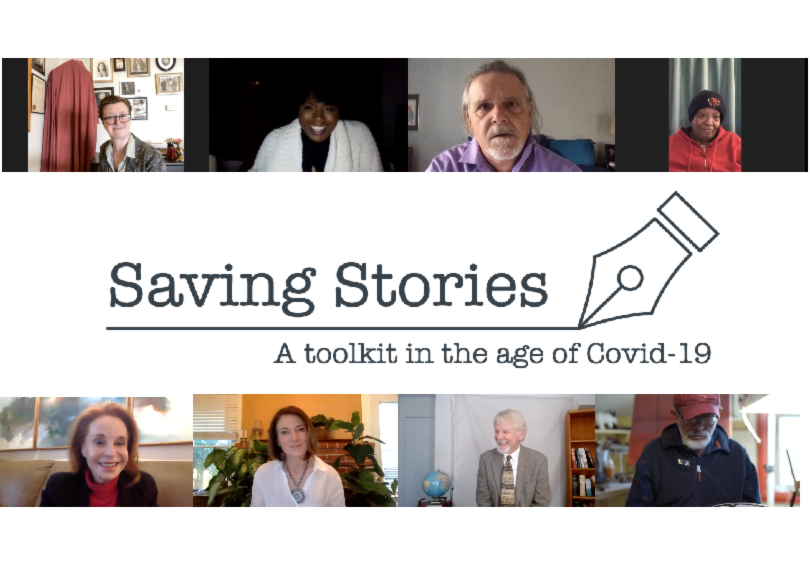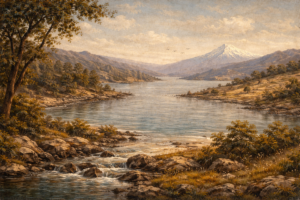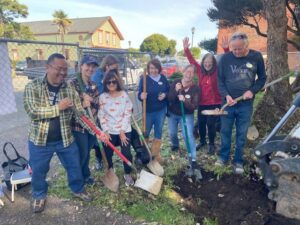“SAVING STORIES: A Connection Toolkit in the Age of COVID-19” is a virtual storytelling project supported by a Humanities for All Quick Grant that debuted in February of 2021, organized by dramatist and director Aleta Barthell, and produced in collaboration with New Village Arts Theatre. Through the “SAVING STORIES” project, Barthell and her collaborators connected interviewers and dramatists with San Diego County-area seniors residing in nursing homes and assisted living facilities to develop personal narratives exploring the lives of the participating seniors.
Since the start of the pandemic, seniors residing in assisted living facilities, like this program’s participants, had experienced significant increases in isolation and loneliness when many care facilities suspended visitation due to the pandemic. To alleviate this loneliness and isolation, “SAVING STORIES” created a new outlet for seniors and the participating writers, actors, dramatists, and family members to virtually collaborate on personal narrative interviews, which were adapted into video monologues, and a personal narrative toolkit, bringing these stories to life. We caught up with Aleta to learn more about the reach and impact of this innovative project.
Can you tell us about some of the senior storytellers residing in assisted living and skilled nursing facilities who took part in this project?
Sylvia M’Lafi Thompson, a professional actor, was our first storyteller. She was in a skilled nursing facility in San Diego at the time. She is an icon in the San Diego theater scene. Her monologue is called “A Piece of My Story.” It was imperative to M’Lafi that people hear her story and the history that she lived through during the Civil Rights movement. We had M’Lafi perform her own piece. She and the director, Anthony Golden Jr., connected immediately. M’Lafi’s father was from the Bahamas, and it came out in rehearsal that Anthony’s family was also from the Bahamas. Anthony described how he felt that M’Lafi was a griot for him, and he wanted to learn as much as possible from her. On our last take, M’Lafi absolutely rejuvenated and delivered a compelling performance.
We also had a 92-year-old former foreign service officer who participated in the project, Richard Matherson. Richard lives in an assisted living facility in Rancho Bernardo. Richard had traveled the globe with his work in the foreign service. After that, he taught at Tuskegee University. So again, connections were made in the process with our director. Anthony Golden Jr., Anthony’s father, had gone to Tuskegee University, so he understood the history of the school and what it meant for a white man to be teaching there, counseling a young Black man. Anthony was able to guide the actor through the material and relationship beautifully.
Given the isolation many of us experienced during quarantine, can you reflect on the impact you observed for the storytellers, dramatists, and actors who took part in this project?
First of all, everybody I encountered was so excited to do this work.
I reached out to Kristianne Kurner, the Executive Artistic Director of New Village Arts Theatre, to see if she would be interested in being a fiscal sponsor and partner for the project. It was my good fortune that she accepted. At that time, Kristianne’s family was juggling caring for a family member with Alzheimer’s at home because they did not want them isolated in a care facility during the pandemic. So the project definitely touched on the personal for her.
Next, I reached out to dramatists. I knew that I needed a talented and diverse group of writers to pull this off, and that’s what I got: Thelma Virata de Castro, Gill Sotu, and Mabelle Reynoso. In our initial meeting, they all expressed the great honor they felt in doing this work.
Honestly, many of our storytellers were puzzled as to why someone would be interested in their story. But, in the end, the connection with the dramatists and sharing the videos with their family and caregivers was the real impact on the experience for them—which was our intent. One storyteller, Nancy Bachmeier, remarked, “Your ten minutes of film has had a very positive impact on my life. Thank you!”
Our actors were all so generous in their time and their talent. They dug into the history that was in the monologue and came so prepared for the work.
Our director, Anthony Golden Jr., had just graduated from the graduate program of the University of Southern California School of Cinematic Arts. He left California to be home with his family in Florida during the pandemic, so we absolutely engaged in some long-distance virtual work together. Anthony’s skill and his love for the project were amazing. We joked about how much we looked forward to doing “another Anthony and Aleta show” together — we got to do eight. We would love to do hundreds more.
With everything shut down due to the pandemic, this project provided individuals with a meaningful way to connect with their community using their talents.
What were some of the biggest surprises that came out of this project?
We added a member to our team, Josh Hill, mid-way through the process. One of our dramatists, Thelma Virata de Castro, had seen his work and thought it fit the spirit of SAVING STORIES. Josh had been taping sessions with his father, Greg Hill, at their family home. Josh’s father has dementia, and Josh had discovered that music was a way that they could connect. So he edited together a song that they created together. It’s called “If You Could Sing a Song,” and it’s absolutely gorgeous and a testament to the power of music.
We had two screenings of the videos with discussions afterward. In our second screening, we had in attendance Carlsbad City Councilmember Teresa Acosta, whose grandmother, Carol Hill, turned out to be one of our storytellers. We did not know that Carol was related to Councilmember Acosta when we started the interview process in the fall. The sponsor for our project, New Village Arts Theatre, is in the City of Carlsbad, so everything was literally hitting home. Carol had been referred to us by a hospice worker who was a colleague of our Humanities Practitioner, Carlyle Coash. The dramatist who worked on Carol’s monologue, Mabelle Reynoso, submitted her piece for review by the family on Tuesday, January 19, 2021. Having received their approval, she turned it to me at the end of the day for production. The next day, January 20, Carol died. Her family expressed immense gratitude that her story was captured through “SAVING STORIES.” Her piece is called “My Favorite Place.”
How can others interested in capturing the personal narratives of friends, family, or community members access the tools you created for “SAVING STORIES?”
You can download our “SAVING STORIES” Toolkit for a guideline on how we operate. You can also download a sample release form from the Dramatists Guild of America that we used for writers to acquire rights to the interview material from the storytellers to create their monologues. You are also welcome to watch our videos here: SAVING STORIES.





